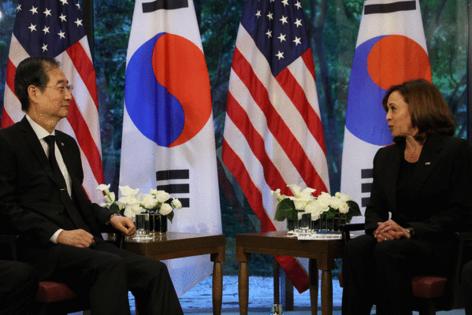South Korea's parliament to vote on impeaching acting president
Published in News & Features
South Korea’s parliament is set to vote Friday on impeaching Acting President Han Duck-soo, potentially deepening a political crisis that has rattled financial markets and disrupted diplomacy efforts.
The vote is scheduled for Friday afternoon at the National Assembly. The main opposition Democratic Party filed the impeachment motion on Thursday after Han resisted pressure to immediately appoint three judges to fill vacancies at the Constitutional Court.
If the vote passes, it would mark the first time an acting president has been impeached in South Korea, and comes less than two weeks since President Yoon Suk Yeol was suspended for briefly instituting martial law. Finance Minister Choi Sang-mok would be next in line to take over as interim leader.
Democratic Party holds 170 seats in the 300-member National Assembly, which it considers sufficient to impeach Han, who’s also prime minister. However, questions remain about the number of votes needed, as suspending a president requires 200 votes, while impeaching a prime minister needs only 151.
The South Korean won declined 0.5% against the dollar to its weakest since 2009. While the won, like other currencies, was affected by a stronger greenback in the third quarter, “obviously the martial law and subsequent noise locally is not helping things,” said Brad Bechtel, global head of foreign exchange at Jefferies LLC.
Han drew condemnation from the opposition when he announced Thursday that he would hold off on appointing the three judges nominated by parliament to fill the vacant seats in the nine-member Constitutional Court. These appointments would lower the bar for confirming Yoon’s removal from office.
The court, which maintains it can still rule with six judges, is set to hold its first pre-trial hearing on Friday and has until June to make a decision. Yoon has vowed to fight in court, saying he declared martial law to protect the nation from an opposition that’s trying to paralyze the government with impeachment motions and cuts to budget plans.
The political turmoil adds to the risks facing South Korea’s economy, which is expected to grow at a slower pace next year. Export momentum is slowing on weaker semiconductor demand, and companies are bracing for Donald Trump’s return to the White House and his protectionist policies.
Recent surveys show confidence among South Korean consumers and businesses has slumped by the most since the global COVID-19 pandemic. Policymakers have pledged “unlimited liquidity” if needed to reassure market participants and mitigate the economic fallout.
(Jaehyun Eom and Shinhye Kang contributed to this report.)
©2024 Bloomberg L.P. Visit bloomberg.com. Distributed by Tribune Content Agency, LLC.







Comments